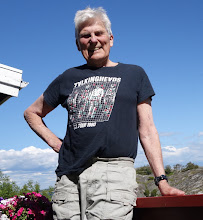UPDATE AFTER PUBLICATION OF COMMENT 2 IN THE NEW YORK TIMES, 20 DECEMBER.
Only the 2d comment submitted was accepted. It was well recommended by readers, and 4 also wrote replies that make "interesting" reading. Comments had been closed when I got the chance to read the replies, otherwise I would have had much to say. I add nothing here since no one has visited this post. If someone does, then I might put one or two replies in here to illustrate how difficult it appears to be for many of my fellow Americans to understand renewable energy. This inserted 2014-12-21 kl. 17:08
Joe Nocera is one of my "favorite" New York Times columnists - "favorite" in quotes. Why? The simple answer is that his infatuation with natural gas is so total that he is a sitting duck for simple comments in the comment column seen to the right of his declarations of ever lasting love for natural gas.
I have just filed two main comments at his column chastising Governor Cuomo (New York State) for banning fracking. The essence of the comments is that Joe Nocera knows so little about renewable energy that he never even can mention renewable energy in his many columns advertising natural gas.
My headline is, of course, ironic. Natural gas kills, most recently as reported in a Times story a couple of days ago. Not the hazard that guns are of course, but more easily avoided than death by a bullet. Use one of the renewable systems described in this blog and nothing to worry about
At the moment on Bus4You toward Göteborg, will add internal links later.
This link takes you to a post by me with photos of Göteborg wind power and Styrsö Ground Source Geothermal (Heat pump) and the additional URLs in the post take you to Fjärrvärme systems (MSW incineration provides hot water to heat just about everything)
Passing Brahe Castle Wind Turbine park, very impressive turbines peacefully producing electricity, each turbine surrounded by picea forest.
Saturday, December 20, 2014
Subscribe to:
Posts (Atom)

